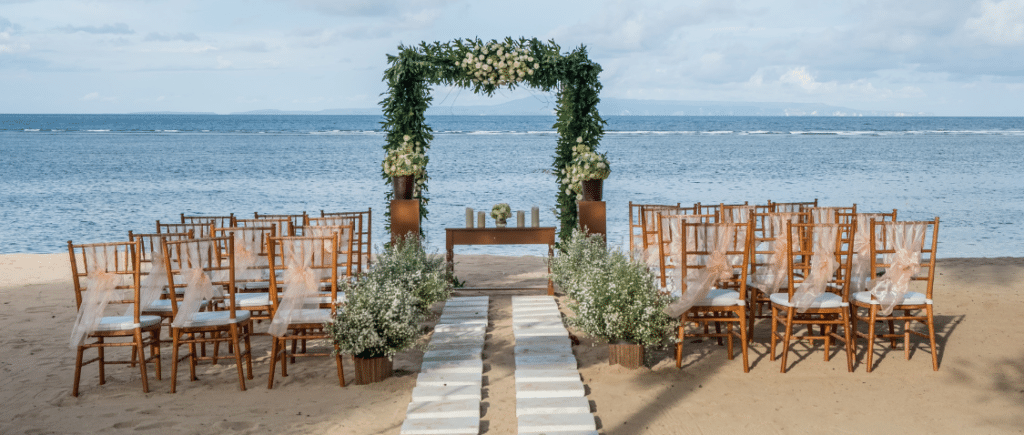Are you engaged and planning your dream wedding? Congratulations! Here’s a complete step-by-step guide to help you simplify and navigate the process with ease and confidence, making your path to ‘I do’ as joyful and stress-free as possible.
Step 1: Set a Budget
Setting a realistic budget is a fundamental aspect of wedding planning, as costs can vary greatly depending on the wedding’s location, style, and size. The venue, number of guests, catering style, and other services can all significantly affect the average cost of a wedding in New Zealand. Breaking down the budget into categories like venue, catering, attire, photography, and entertainment is crucial. Including a contingency fund, typically around 10% of the total budget, is wise for unexpected expenses. Venue and catering usually comprise the most significant budget share, so look for cost-effective options like package deals.
When planning your budget, consider seasonal cost variations, as weddings during the peak season (summer months in New Zealand) tend to be more expensive. Opting for an off-peak-season wedding can be more economical. Embrace DIY options for invitations or decorations and utilise local resources to save costs, such as sourcing local flowers or hiring a local band. Keeping a detailed spreadsheet to track all expenses, including quotes, actual spending, and deposits, is essential for controlling your finances and preventing overspending. If family members contribute financially, clear communication about who pays for what is vital will help avoid misunderstandings later in the wedding planning process.
Step 2: Choose a Venue
Choosing the right venue is crucial to planning your dream wedding. Your venue should reflect the style and theme of your wedding, whether it’s a rustic countryside setting, a chic urban space, or a relaxed beachfront. New Zealand’s range of venues caters to all preferences, offering unique ambiences and aesthetics to match your vision. When selecting a venue, consider its location, especially if many guests travel from afar. Venues near major transport hubs or with nearby accommodations are practical for out-of-town guests. At the same time, remote locations like Waiheke Island or Central Otago offer a more intimate setting.

Visiting potential venues is essential to understanding their space, layout, and overall feel. This firsthand experience allows you to assess the venue’s suitability for different aspects of your dream wedding, such as the ceremony, reception, and dining areas. During these visits, evaluate the venue’s capacity, ensuring it can comfortably accommodate your guest list and the flow of your event. Additionally, enquire about what’s included in the venue hire, like furniture, catering, and audio-visual equipment, as this will impact your planning and budgeting.
Finally, consider practical aspects such as weather, venue restrictions, cost, and availability. New Zealand’s weather can be unpredictable, so having a backup plan for outdoor venues is essential. Be aware of any restrictions the venue may have, like noise curfews or decoration limitations, as these can influence your planning. Popular venues can book out quickly, especially during the summer wedding season, so check availability and ensure the cost aligns with your budget.
Step 3: Select a Date
Selecting the ideal date involves considering various factors, such as seasonal weather patterns, public holidays, and venue availability. The choice of season is crucial, with summer being the most popular due to warm weather and longer days. However, this also means higher demand for venues and vendors. Autumn and spring offer mild weather and scenic beauty, ideal for outdoor weddings, while winter allows for cosy indoor celebrations with potentially lower costs and better availability. It’s essential to be mindful of public holidays and long weekends, as they can lead to higher travel and accommodation costs and affect guest availability.
In addition to seasonal considerations, other factors such as personal preference, guest availability, local events, and weather patterns play a role in choosing a wedding date. Ensuring the selected date accommodates important guests, especially those travelling from afar, is essential. Consider the day of the week; while Saturdays are popular, a weekday can offer more flexibility and potentially lower costs.
Step 4: Pick a Theme
Selecting a wedding theme is essential as it reflects your personal style and story, influencing every aspect of the event, from invitations to attire. It’s about creating a cohesive look and feel that resonates with who you are as a couple. Themes can vary widely from rustic to garden, modern to vintage, or cultural to romantic. Each theme has unique elements, like rustic weddings featuring natural textures and wildflowers.
Integrating the theme into every aspect of your dream wedding is crucial. This includes the design of invitations, venue decor, wedding attire, menu choices, and entertainment, all reflecting the chosen theme. The key is personalising your theme to make it uniquely yours, mixing elements to tell your story, and making your wedding day memorable. It’s not just about following a theme; it’s about creating an atmosphere that truly represents you as a couple.
Step 5: Book Vendors
Getting your dream wedding team right is a pivotal step in wedding planning, as they play a crucial role in bringing your wedding vision to life. Key vendors include caterers, photographers, videographers, florists, entertainers, wedding planners, hire companies, makeup artists, hair stylists, and transportation providers. Each vendor serves a specific function, from creating the perfect ambience with floral arrangements to capturing memorable moments and providing entertainment that aligns with your wedding’s theme. Choosing vendors whose style and expertise match your vision and who have a reputation for reliability and quality service is essential.
The wedding vendor booking process involves thorough research, reading reviews, and seeking recommendations, followed by meetings to discuss your vision and obtain quotes. Early confirmation of their availability on your wedding date is crucial, and securing their services with a detailed contract is necessary. Regular communication and check-ins with your vendors are important to ensure everyone is aligned with your plans. Additionally, it’s wise to have backup plans and understand the cancellation policies of each vendor to mitigate any unforeseen circumstances.
Step 6: Finalise The Details
This step is about ensuring all dream wedding elements are in place, confirming arrangements, and making necessary adjustments. It’s a phase where the focus shifts from broad planning to the specifics that will make the day unique and seamless.
Reviewing and Confirming Plans
- Final Walkthrough: Conduct a last venue review with vendors to discuss layout and logistics.
- Timeline Confirmation: Ensure all vendors and bridal parties know the event’s schedule.
- Vendor Check-In: Reconfirm details and timings with all vendors, providing clear day-of contact information.
Attention to Detail
- Seating and Place Cards: Finalise the seating arrangement and prepare place cards, considering guests’ special needs.
- Attire Checks: Complete final fittings for wedding attire and confirm arrangements for attire management.
- Emergency Kit: Assemble a kit with essentials like safety pins, a sewing kit, and band-aids for unforeseen issues.
Communication and Coordination
- Bridal Party Briefing: Inform the bridal party of their roles and responsibilities.
- Guest Updates: Communicate any last-minute changes to guests, especially regarding logistics.
- Rehearsal: Use any rehearsal to smooth out ceremony details and ensure everyone understands their roles.
Final Touches
- Decor and Signage: Confirm all decor details, including table settings and special displays.
- Music and Entertainment: Finalise music playlists and confirm timings with entertainers.
- Personal Items: Ensure all items, like the guest book and toasting glasses, are ready and will be at the venue.
Step 7: Plan Your Honeymoon
Don’t forget to plan your honeymoon. Whether it’s a relaxing beach getaway on the Coromandel Peninsula, a scenic trip to Queenstown, or a romantic escape to the vineyards of Central Otago, New Zealand offers a plethora of options for a memorable honeymoon. You may even prefer adventurous African safaris. The key is to select one that resonates with your joint preferences. Start planning early to ensure availability and the best deals. It’s important to manage logistics well in advance, including travel arrangements, accommodations, and an itinerary that balances relaxation with activities.
Making your honeymoon special involves adding personal touches like romantic dinners or adventure activities you’ve both longed to try. Plan to create and capture lasting memories, whether through photography, journaling, or simply savouring each moment together. Allow some time between your wedding and the honeymoon for rest, and decide on your level of connectivity during the trip, whether it’s a complete digital detox or sharing your journey on social media. This post-wedding retreat is not just a holiday but a memorable start to your married life, blending relaxation, adventure, and romance in a way that’s uniquely yours.
